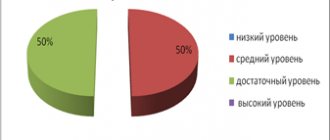The concept of the lexical structure of speech
The concept of the lexical structure of speech
Speech is a complex activity of the anatomical and physiological apparatus, which consists of central and peripheral organs. All organs of the speech system are inextricably linked with each other and interact under the influence of the cerebral cortex.
Defective speech functioning has a negative impact on all areas of a child’s personality, namely: the development of his cognitive activity is hampered, memorization productivity is reduced, logical and semantic memory is impaired, children have difficulty mastering mental operations, all forms of communication and interpersonal interaction are disrupted, and the development of play is significantly inhibited. activities. Therefore, his development of speech, its lexical component, is necessary both for the most complete overcoming of systemic speech underdevelopment, and for preparing children for the upcoming schooling.
Before considering the process of clarifying, enriching and activating the vocabulary, it is necessary to define the concept of the lexical structure of speech, vocabulary and lexeme. Researchers testify that the formation of the lexical structure of speech is determined, first of all, by the level of intellectual development of the child, and is directly related to the functioning of various types of thinking, visual-effective, visual-figurative, verbal-logical and other mental processes, as well as with the development of all components of the language system . In addition, the formation of vocabulary is determined by the influence of the social environment.
The lexical structure of speech is a component of language, which includes active and passive vocabulary, the ability to use it in a specific situation. The structure of the lexical structure of speech includes: nominative, predicative and attributive dictionaries, as well as dictionaries of auxiliary parts of speech (adverbs, pronouns, etc.
The lexical level of a language is a set of lexemes that are the result of the mechanisms of word formation and inflection. Full mastery of speech presupposes adequate mastery of speech in the unity of form and content. A specific word, already at the moment of its appearance, is both a sound and a meaning. Having its own structure as a linguistic sign, it is included in the language system and functions in it according to the laws of the given language.
The lexeme comes from the Greek. lexis - word, expression, figure of speech - a unit of the lexical level of language, established as a set of all forms and meanings of one word. This understanding of the lexeme was proposed by V.V. Vinogradov. It allows us to remove the contradiction in the understanding and use of the term “word”, on the one hand, as a system of forms and functions, recognized against the background of the structure of the language as a whole, and, on the other hand, as a separate form of the word realized in speech. For example, all the word forms river, rivers, river, river, rivers, (about) rivers and the different meanings of these forms in the statements: a river flows, swim in a mountain river and shed rivers of blood, are realizations of the same lexeme river. The lexeme as a unit of the nominative system and an element of the language structure is characterized by semantic unity and has the ability to express various lexical and grammatical meanings.
The concept of a word includes a linguistic unit that serves to designate (name) objects and characteristics (actions, relationships, qualities, quantities). The meaning of a word is understood as the reflection in the word of the realities of reality (objects, signs, wear, processes, etc.). The main function of a word is to name reality (the so-called nominative function) and generalize.
A dictionary is words (basic units of speech) denoting objects, phenomena, actions and signs of the surrounding reality. There are passive and active dictionaries. Passive vocabulary is understood as part of the vocabulary of a language that is understandable to a child. It depends on age, mental development, social environment. Active vocabulary is part of the vocabulary of the language that is freely used in everyday life by a particular child.
Vocabulary composition represents the most mobile language level. The vocabulary reflects all processes of the historical development of society. With the advent of new objects and phenomena, new concepts arise, and with them, words for naming these concepts. Taking all this into account, the vocabulary of the national language can be divided into two large groups: an active dictionary and a passive dictionary.
Large psychological dictionary, ed. B.G. Meshcheryakova defines “active vocabulary” as a set of words that a person uses when constructing statements (in oral and written speech); and “passive vocabulary” is a set of words that a person more or less accurately understands (when reading and listening), but does not use in speech. The passive vocabulary is wider than the active vocabulary.
The passive vocabulary includes those that are either outdated or, conversely, due to their novelty, have not yet become widely known and are also not used every day. Thus, words of the passive stock are divided, in turn, into obsolete and new (neologisms). Those words that have fallen out of active use are classified as obsolete. For example, words that have ceased to be used due to the disappearance of concepts that they meant: boyar, clerk, veche, streltsy, oprichnik, vowel (member of the city duma), mayor, etc. The words of this group are called historicisms; they are more or less known and understandable to native speakers, but are not actively used by them [45, p. 335].
If the concept of an object, phenomenon, action, quality, etc. is preserved, and the names assigned to it are replaced in the process of language development by new ones, more acceptable for one reason or another for a new generation of native speakers, then the old names also become category of passive vocabulary, into the group of so-called archaisms (Greek archaios - ancient). For example: ponezhe - therefore, vezhdy - eyelids, gostba - trade, etc. Some of the words of this type are practically beyond the boundaries of even the passively existing lexical reserves of the modern literary language. For example: thief - thief, robber; stry - paternal uncle, stryinya - paternal uncle's wife. The process of transition of words from the group of active use to the passive group is long. It is caused by both extra-linguistic reasons, for example, social changes, and linguistic ones, of which a very significant role is played by the systemic connections of obsolete words: the more extensive, varied and durable they are, the slower the word passes into the passive layers of the dictionary. Obsolete words include not only those words that have long gone out of use, but also those that arose and became obsolete quite recently, for example: educational program (liquidation of illiteracy), etc.
New words, or neologisms (Greek peos - new, logos - concept), are, first of all, words that appear in the language to denote new concepts, for example: cybernetics, letilan (antimicrobial fiber), interferon (medicine), and etc. Such words form a group of proper lexical neologisms. The emergence of new names for those concepts that already had a name in the language is also one of the ways in which neologisms appear. In this case, there is a loss of some words due to the activation of others, synonymous with the first, then the transition of the repressed words into passive layers of vocabulary, i.e. their archaization.
Neologisms are also words newly formed according to certain normative models from words that have existed for a long time. For example: asset – activist, activist, activist, activism, activation; atom - nuclear-powered ship, nuclear scientist, atomic specialist; and many other simple and complex words that make up the group of so-called lexical and word-forming neologisms.
Neologisms also include words and phrases previously known in the Russian language that have developed a new meaning, cf., for example, pioneer - pioneer and pioneer - member of a children's communist organization.
Semantic updating of words is one of the most active processes that replenish the lexical system of the modern Russian language. Around a word that begins to live anew, completely new lexemes are grouped, new synonyms and new oppositions arise.
If you can get the necessary information about outdated vocabulary (historicisms and archaisms) in explanatory dictionaries, as well as in special historical dictionaries of the Russian language, then until recently there was no special dictionary of new words, although interest in neologisms arose a very long time ago.
The dictionary, as the compilers and publishers note, is not normative. It explains and illustrates that part of the new words and meanings (about 3500) that have become more or less widespread (this should not be confused with the concept of an active vocabulary).
The concept of actualization comes from the Latin “aktualis”, i.e. “activity”, which allows us to perceive actualization as bringing the potential (latent) state of the subject into a state of activity (activity). In the same sense, “actualization” is also interpreted in philosophy as a concept meaning a change in being based on the idea of transition from possibility to reality. In sociology, the concept of “updating” is part of the more general concept of “social activity” and is defined by the degree of response to changes in the social environment.
Nowadays, in modern scientific and methodological literature on speech therapy, the concept of “vocabulary updating” is used. In the study by A.V. Egorov’s term “updating” is understood as a process aimed at clarifying, enriching, systematizing a child’s existing vocabulary and translating an impressive vocabulary into expressive speech (inclusion of a word in a phrase, sentence, text message) [38, p. 75-76].
Also in the pedagogical encyclopedia, the concept of “knowledge actualization” is analyzed, defined as the performance of actions consisting of retrieving learned material from long-term or short-term memory for its subsequent use in recognition, recall, recollection or direct reproduction [32, p. 18].
In research on correctional pedagogy and special psychology N.V. Novotvortseva presented the concept of actualization as follows: “Actualization - (from the Latin aktualis - actual, existing) - translation into action, in a state of activity, of what was only potentially available.” In psychology, this is the restoration in memory of what was previously retained or preserved: images, movements, thoughts, verbal statements, feelings, carried out in the processes of recognition and reproduction.
It is generally accepted in speech therapy that the concept of vocabulary activation was used by such scientists as: R.I. Lalaeva, V.I. Seliverstov, T.B. Filicheva and many other researchers.
Translating words from a passive dictionary into an active dictionary is a special pedagogical task. Introducing into children’s speech words that they themselves have difficulty mastering and use in an erroneous form requires pedagogical efforts.
L.G. Paramonova points out that the processes of enrichment and systematization of vocabulary are almost impossible to differentiate, since they must occur simultaneously. By enriching the vocabulary we mean introducing the child to as many words as possible, provided that they are clearly correlated with real objects, actions and signs of objects and actions, so that the child understands well what exactly is hidden behind each word. The concept of systematization of vocabulary includes its division into separate groups of words, identified according to certain principles accepted in the Russian language.
Thus, the more vocabulary a person has, the richer and more expressive his speech and the more subtle nuances of his thoughts he is able to convey. The scale of the “vocabularies” of different people with a normal level of speech development is very large - from 6 to 25 thousand words. As researched by A.R. Luria, the first of these numbers provides a person with the opportunity to freely communicate in a given language.
Clarification of the dictionary is dictionary-stylistic work, development of the flexibility of the dictionary, its accuracy of expressiveness, which includes:
- filling the words that have been learned with content is not entirely accurate, which is ensured by including them in the context, juxtaposing and comparing them with other words;
— mastering the lexical compatibility of words, including in phraseological units;
- mastering the allegorical meanings of words, the ambiguity of words;
- mastering lexical synonymy and those nuances of word meanings that are characteristic of individual synonyms in a synonymous group.
Thus, the concept of “actualization” is associated with “activity (activity)”; in psychological and pedagogical research, “actualization” is considered as a translation into action, in a state of activity, of what was only potentially present; in correctional pedagogy, “vocabulary updating” is interpreted as a process aimed at clarifying, enriching, systematizing the child’s existing vocabulary and translating impressive vocabulary into expressive speech.
In the process of developing the lexical component of a child’s speech at different stages, the child owns a different number of lexical units, which are not enough for him to carry out full communication. In the framework of this study, the concepts of “speech vocabulary” and “language vocabulary,” “word” and “lexeme” will be used as synonymous concepts.
List of used literature:
Alekseeva, M.M. Methods of speech development and teaching the native language of preschoolers / M.M. Alekseeva, B.I. Yashina: - M.: Publishing House, 2000. - 400 p.
Volkova, L. S. Speech therapy [Text] / Ed. L. S. Volkova, S. N. Shakhovskaya. M.: “Vlados”, 2009. 703 p.
Karaulov, Yu.N. Russian language: Encyclopedia /Yu.N. Karaulov. – 2nd ED., Revised. and additional – M.: Bolshaya Ross. Encycl. : Bustard, 1997
The importance of speech development in children at preschool age
The development of speech in children is perceived by many adults as the main indicator of intelligence. This approach is explained by the fact that awareness and logic can be traced in statements and conversation. Of course, thinking and speech as mental processes are closely interrelated. But speech development is only part of the intellectual level of an individual.
At the same time, for a preschooler speech is a multifunctional tool. With its help, he receives information and establishes contact with the outside world. Words help the child consolidate the result of objective activity in his mind. Thanks to speech, children come to perceive and use images.
The speech of a preschooler is egocentric and spontaneous. He speaks more to himself, using repetition and monologue. It's like thinking out loud, with the pronunciation of which comes understanding. Words serve as an activity enhancer and support the child in his actions.
For preschool children, the cognitive and communicative functions of speech are equally important. By listening to adults, they absorb information and discover the world around them. At the same time, children learn to speak and strive to be understood.
Speech development tasks
The psycho-speech development of a child occurs, first of all, due to the natural processes of maturation of the body and the formation of personality. Everything that a baby unconsciously guides while exploring the world is his needs. Adults understand perfectly well that a child must cover a considerable distance in speech development in just a few years. By the time it is time to go to school, a preschooler needs to:
- Know and use many words
- Speak clearly and coherently
- Using speech, receive various cognitive information
- Communicate with peers and adults
The listed tasks are the most important in the speech development of preschool children. They are resolved gradually at each age stage.
Parents' activity in the development of their child's speech
It is important for parents to consider that each child has his own individual pace of development. Noticing problems in the development of speech in their child in the preschool period and some discrepancy with the norms, they should not jealously compare with others and catch up with their peers, at all costs. However, this issue cannot be ignored.
Parental assistance is necessary for a preschooler in cognitive and speech development. Children, with the support of their parents, successfully progress in the following areas:
- vocabulary formation
- word creation
- development of verbal description skills.
In everyday communication with a child, parents have hundreds of opportunities to use new concepts and explain what they mean. Such simple participation of adults will significantly expand the active vocabulary of a preschooler.
Word creation allows the child to better understand the language and contributes to the development of a sense of rhythm. In addition to benefits in speech development, this activity brings incredible pleasure to children. Emotional speech, joint invention of new words with mom or dad is always accompanied by laughter and a joyful mood.
Parents can successfully teach verbal descriptions to their child. An adult can tell stories and describe what is happening to a preschooler, giving an example of a coherent statement, and then invite him to similarly describe what he sees around him. These activities are easy to do and can be done in any environment - at home or on a walk.
Development of children's speech in different types of activities
The relationship between speech and the content of activity intensifies with age. The need for verbal expression differs in different types of activities.
While playing with his toy, the preschooler conducts a dialogue with it. This one-sided conversation can be internal, not expressed in words. But more often the child says out loud all his calls to his toy friend.
Playing with peers offers other conditions. It is necessary to contact your partner, it is also important to hear him and exchange information. If at younger preschool age verbal communication in the game is simple and may be limited to role-playing participation, then older preschoolers often use explanatory speech.
The speech of a preschooler, which presents a holistic message and fully describes the situation, is called explanatory.
Explanatory speech develops well when preschoolers agree on the rules of the game or coordinated actions and explain the structure of the toy.
The creative activity of a preschooler is also permeated with speech. A child's drawing often needs explanation. And not only due to the fact that the adult asks what is shown on the sheet. More often than not, the author himself wants to tell what he drew. Speech description invariably enriches the content of the picture. Or dots the i's if something incomprehensible is depicted.
With the help of speech, children convey the character of their characters, thus overcoming the limitations of their own artistic abilities.







